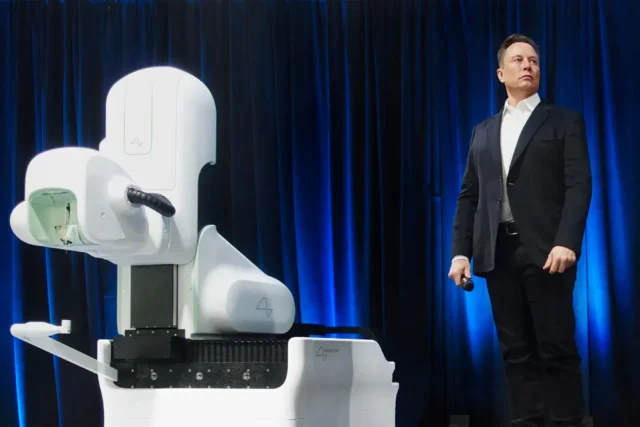
In an unprecedented stride towards the fusion of human cognition and digital technology, Elon Musk’s brain implant company, Neuralink, has recently marked a significant milestone by successfully conducting the first human implantation of its brain-computer interface (BCI) device. This development not only showcases the potential for revolutionary medical treatments but also paves the way for direct human interaction with computers, fundamentally altering our relationship with technology.
Key Highlights:
- Neuralink has received FDA approval for its first human clinical trials, signifying a major leap forward in brain-computer interface technology.
- The first human patient has been implanted with Neuralink’s device, showcasing promising initial results in neuron spike detection.
- The technology aims to assist patients with severe paralysis and degenerative diseases by enabling control of external devices through neural signals.
- Concerns and controversies surrounding Neuralink’s animal testing and safety protocols have been noted, emphasizing the need for rigorous scrutiny in the advancement of such pioneering technologies.
Understanding the Neuralink BCI: A Leap Towards the Future
Neuralink’s brain-computer interface, known as the Link, represents a cutting-edge attempt to bridge the gap between the human brain and digital devices. By decoding neural signals, the technology intends to provide individuals suffering from severe neurological conditions with newfound abilities to communicate and interact with their environment. This BCI system is predicated on the implantation of ultra-fine threads within the brain, which transmit neural signals with high fidelity, thereby allowing for precise control over connected devices.
The Path to Human Trials
The journey to this groundbreaking human trial has been fraught with both anticipation and controversy. Despite facing federal scrutiny and ethical concerns over its animal testing practices, Neuralink persevered, eventually securing FDA approval for human testing. This approval followed extensive research and development efforts, aimed at addressing potential safety concerns related to the device’s battery, the risk of wire migration within the brain, and the challenges of safely extracting the implant.
Implications and Ethical Considerations
The successful implantation in a human subject marks a significant milestone for Neuralink, offering a glimpse into a future where the integration of human cognition and artificial intelligence could become commonplace. However, this advancement also underscores the importance of addressing ethical concerns and regulatory challenges associated with such invasive technologies. The safety of participants, the reliability of the technology, and the implications of brain data privacy are paramount considerations that must be navigated carefully as we venture further into this uncharted territory.
As Neuralink continues to refine its technology and expand its clinical trials, the potential applications of BCI extend far beyond medical treatments. The prospect of enhanced cognitive capabilities, direct brain-to-internet connectivity, and even forms of telepathy represent transformative possibilities that could redefine what it means to be human in the digital age. However, achieving these ambitious goals will require not only technological innovation but also a robust ethical framework to ensure the responsible development and deployment of BCI technology.
Neuralink’s recent achievements represent a significant step forward in the realm of brain-computer interfaces, offering hope for those with debilitating conditions while also opening up new avenues for human enhancement and interaction with technology. As we stand on the brink of this new frontier, it is imperative that we proceed with caution, ensuring that ethical considerations and human well-being remain at the forefront of this technological evolution.










